Posted by Elena del Valle on May 24, 2013
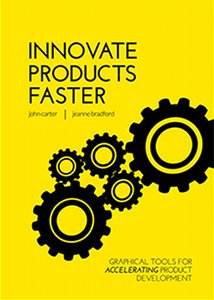
Innovate Products Faster book cover
Photo: TCGen Press
Developing new products does not require a slow and ineffective process. In Innovate Products Faster: Graphical Tools for Accelerating Product Development (TCGen Press, $19.95), John Carter and Jeanne Bradford, chief executive officer and principal respectively of TCGen Inc., make the case that companies can have innovation and speed. To do so, they say, it is necessary to have mastery of tools and methodologies that will support managers in making better decisions faster. They say the tools available should be those that can be quickly understood and implemented. They should be “tactically straightforward, but strategically powerful and can be applied across different industries and organizations, from start-ups to Fortune 100 companies,” according to the consultants.
For managers and their teams they propose a Product Innovation Process they have refined and tested with 50 clients. It has three checkpoints, Concept Check-In, Product Check-In, and Release Check-In, or defined interactions between the management and the core cross-functional development teams.
They serve as peer-to-peer discussions rather than critical, hierarchical, and stress-filled reviews. Carter and Bradford outlined five core disciplines and subsets of best practices for each one. The chapters, each dedicated to a single best practice, are divided into three parts: a description, a graphic and a fictional case study. The authors indicate the best practices apply to hardware, software, cloud, device or service development. They rely on three fictional companies to illustrate the case studies outlined throughout the book.
The 240-page soft cover book is divided into an Introduction and four sections: Strategy, Management, Execution, Organization, and Process. The authors suggest readers start at the Appendix where they list the solutions for the most common problems.
Carter, founder of the company, has advised technology firms such as Apple, Cisco, NetApp and IBM, over a 35-year career. He serves on the Board of Directors of Cirrus Logic. He has raised private equity to successfully execute a roll-up in the Consumer Electronics sector and has assumed senior executive roles.
Comments:
Filed Under: Books
Posted by Elena del Valle on May 20, 2013
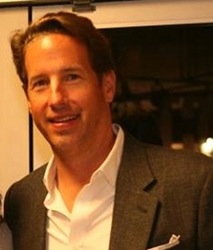
John Teeuws, VP, Pulpo Media
Photo: Pulpo Media
A podcast interview with John Teeuws, vice president, Pulpo Media, is available in the Podcast Section of Hispanic Marketing & Public Relations, HispanicMPR.com. During the podcast, he discusses communicating effectively with Hispanics online with Elena del Valle, host of the HispanicMPR.com podcast.
John manages sales to major US agencies and accounts. Prior to working at Pulpo Media he worked with the sales teams at Tribal Fusion, Spot Runner, Placecast, and Stack Media. John began his advertising sales career at The Washington Post Company where he managed the Company’s Global/International and Recruitment/Jobs Advertising divisions.
Prior to entering a career in advertising, John worked in international affairs, trade and investment primarily focused on the Asia Pacific Market for the US ASEAN Business Council, the US-Philippine Business Committee and the Chief Executives Organization.
To listen to the interview, scroll down until you see “Podcast” on the right hand side, then select “HMPR John Teeuws” click on the play button below. You may download the MP3 file to your iPod or MP3 player to listen on the go, in your car or at home by clicking on “Get HMPR Podcast” above the podcast player. The podcast will remain listed in the May 2013 section of the podcast archive.
Posted by Elena del Valle on May 17, 2013
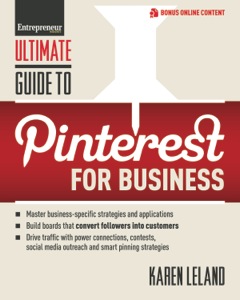
Pinterest for Business book cover
Photos: Karen Leland
Karen Leland, owner of a branding and marketing firm, believes in the power of Pinterest. People love pictures, she says. She points to recent studies that indicate that nearly 20 percent of women using the Internet are on Pinterest, 72 percent of Pinterest users are women, 66 percent of those are age 35 or older, and the average amount of time visitors spend surfing the Pinterest site is an hour.
In Entrepreneur Magazine’s Ultimate Guide to Pinterest for Business, a 189-page soft cover book published this year, she set out to create an easy-to-use guide to Pinterest as a valuable source of prospects, promotion and profits. The book that retails for $21.95 is divided into 17 chapters.
“Great business brands are about telling compelling, congruent stories, and Pinterest is at its core about storytelling in pictures,” said Leland in a press release. “Pinterest has tapped into this visceral lover of visuals, and no small business, entrepreneur or corporation can afford to miss the boat on bringing what they offer beyond words and into images.”
She begins the book by pointing out that the popular social media website is the fastest growing social media website in history. It had 10 million users when she wrote the book. Her promise to readers is: to show them the basics of getting started in Pinterest; building boards that make fans become customers; creating a Pinterest community from activities that drive engagement and appropriate strategies; applications for small businesses; and best practices.

Karen Leland, author, Pinterest for Business
In the final chapter, she mentions a bonus chapter available on her website as an ebook, a podcast with her about opportunities and mistakes, a webinar on the business use of Pinterest and a marketing quiz. She outlines a three-step process to apply her method. She also invites readers to connect with her on social media and to hire her consulting or public speaking services.
Leland is president of Sterling Marketing Group where her clients include AT&T, Apple, American Express, Cisco, Johnson & Johnson, Marriott Hotels and Oracle. She is the author of eight books.
Comments:
Filed Under: Books
Posted by Elena del Valle on May 13, 2013
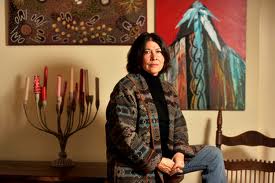
Rebecca Adamson, president, First Peoples Worldwide
Photo: First Peoples Worldwide
A podcast interview with Rebecca Adamson, president, First Peoples Worldwide, is available in the Podcast Section of Hispanic Marketing & Public Relations, HispanicMPR.com. During the podcast, she discusses the value of indigenous economics with Elena del Valle, host of the HispanicMPR.com podcast.
Rebecca, a Cherokee economist, is also founder of First Peoples Worldwide. A leader, activist, and ground-breaking indigenous woman, Rebecca holds a distinct perspective of how indigenous people’s value and economic systems can transform business models of today. Since 1970, she has worked directly with grassroots tribal communities, and nationally as an advocate of local tribal issues.
She established the US development institute, First Nations Development Institute in 1980. In 1997, she created the United States based global indigenous peoples non government organization First Peoples Worldwide. Rebecca’s work established the first microenterprise loan fund in the United States; the first tribal investment model and a national movement for reservation land reform.
As one of few Native Americans on a mutual fund board, the Calvert Social Investment Funds, Rebecca led the creation of the Calvert Foundation’s Community Notes, the only private sector investment vehicle for community development financial institutions or CDFIs. Last year some of her efforts led the International Finance Corporation, the World Bank and the UN Principles of Responsible Investors to adopt standards for implementing policies regarding Indigenous Peoples, human rights and transparency.
To listen to the interview, scroll down until you see “Podcast” on the right hand side, then select “HMPR Rebecca Adamson” or click on the play button below. You may also download the MP3 file to your iPod or MP3 player to listen on the go, in your car or at home by clicking on “Get HMPR Podcast” above the podcast player. The podcast will remain listed in the May 2013 section of the podcast archive.
Posted by Elena del Valle on May 9, 2013
Information provided by Event Partner
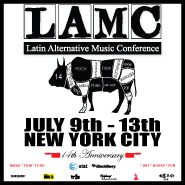
Latin Alternative Music Conference New York City July 9-13, 2013
LAMC (Latin Alternative Music Conference) is the only major conference celebrating and supporting genres of Latin music that are left of center and forging the way Latinos, especially young, bicultural Latinos in the U.S., define themselves. The LAMC is also the largest Latin music conference in the US.
The 14th annual LAMC will break new ground, inaugurating a new, expanded focus on a diverse array of special events dedicated to music, food, film, books, art and poetry.
www.latinalternative.com
Posted by Elena del Valle on May 7, 2013

The Department of Public Relations, a leader in public relations education, research, and professional outreach, invites applications and nominations for the position of Chair and Professor to begin January, 2014. The diverse faculty members in the department value the scholarly, collegial, and collaborative culture that exists within the Department and across the College. Click to read the entire Chair and Professor College of Journalism and Communications Department of Public Relations
Posted by Elena del Valle on May 6, 2013

A still image from the Es Fácil Ser Hombre ad campaign – click to enlarge
Video, photos: Formulatin
Beer maker Tecate wants to win over Spanish speaking and bilingual men 21 years of age and older in the United States and Mexico with Es Fácil Ser Hombre, its most recent Spanish language ad campaign. The company’s three 30-second TV spots, three 60-second radio spot and out-of-home ads will run across what its marketing executives consider its key Spanish language markets in the United States and Mexico.
The TV spots, filmed and produced in Mexico City, were completed in late 2012 and the radio spots in early 2013 by a team led by Felix Palau, vice president of Marketing for Tecate.
In the United States, the campaign will air in California, Texas, New Mexico, Arizona, and Illinois. Handled by MediaVest MV42, the media buy includes Univision, Telemundo, Unimas, Galavision, Estrella TV, Fox Deportes, ESPN Deportes, Univision Deportes, Azteca, LA TV and Nuvo TV. Scroll down to watch an ad from the campaign in Spanish.

A still image from the Es Fácil Ser Hombre ad campaign
“It’s important for us to ensure that our brand communication efforts in the U.S. and in Mexico are aligned. However, because we understand that there are nuances between Hispanic men living in both countries, we tested our Mexico-created spots in our key U.S. markets. We’re very happy with the positive feedback we received from consumers in these focus groups, and are certain that the inherent wit and humor in the spots is relevant to all Hispanic men con carácter,” said Palau by email.
The company launched the TV and radio spots April 22 and the OOH began rolling out April 29. The campaign is expected to run through the summer and into early fall. Company representatives declined to disclose the campaign budget or the number of staff involved in the project.
The campaign was created by Olabuenaga Chemistri, Tecate’s Mexico City advertising agency of record. The staff designed the campaign around “real-life situations” they hope men relate to, showcasing “how they use their ingenuity, wit and humor to resolve these without losing their carácter.”
In the first 30 second spot titled Boda (Wedding), the bride throws the bouquet and is confused when it bounces back. After a few tries the camera turns to reveal a man jumping in to throw the flowers back to the bride. The spot ends with the narrator saying “A man prefers an uncomplicated life.”
Llaves (Keys), the second spot in the campaign, shows a man coming home late from a night out. When he tries to open the door he realizes he does not have his keys and uses his cell phone to call for help. A group of mariachis show up to serenade his wife, which leads to her opening the door and letting him in without knowing he had forgotten his keys and without reprimanding him for his late arrival. The narrator closes the spot with “A man knows there is always another way in.”
The third and last spot, Pétalos (Petals), shows a woman coming home and finding a path of rose petals and candles that lead her down the hall to the refrigerator. She hears her husband calling from another room: “Honey, since you’re already in the kitchen, could you please bring me a Tecate?” The narrator finishes by saying: “A man knows how to get what he wants.”
The Spanish-language radio and out-of-home were designed to have the same tone as the TV ads. The first of the three 60 second radio spots, Pregunta (Question), opens with a woman pressing her husband to ask for directions when they find themselves lost while driving. She’s surprised when the man agrees, and even more so when her husband pulls over to inquire about the score of the soccer game. The spot ends with the narrator saying, “A man only asks questions when it’s necessary.”

A still image from the Es Fácil Ser Hombre ad campaign
In the second spot, Teléfono (Telephone), a man tells his male friend he needs to leave the bar to go home, and is chastised for wanting to leave just to please his wife. The main character calls home to check in, and upon hearing his wife’s angry response he pretends to be a pizza delivery guy, hangs up the phone and decides to stay at the bar. The narrator finishes the spot saying: “A man knows how to test the waters.”
The third radio spot, Película (Movie), begins with a man asking his girlfriend if she’d like to stay in for a movie night at home. When the woman states she loves the idea, the man says: “That’s great! I do want to go out with my friends so I’ll see you later!” A narrator closes the spot with, “A man takes advantage of any oversight.”
The first OOH creative features a puppy with the word anzuelo (hook), while the second one shows a pair of sunglasses at the beach, reflecting a woman and the word escáner (scanner) written underneath. The ad creators tied radio and OOH to the campaign by using the brand tag line Es Fácil Ser Hombre. Con Carácter.
“For the past few years, we have been building upon Tecate’s values, which include carácter, masculinity, and ingenuity, and are excited to see those traits exemplified in this campaign,” said Palau. “Since the ads are running in Mexico and the U.S. to ensure consumers on both sides of the border are being exposed to the same messaging, we had to ensure the scenarios presented were relatable to all Hispanic men, not just Mexicans. We are proud of the end result and hope consumers enjoy the light-hearted nature of this campaign.”
Tecate is a brand of Heineken, USA Inc., a leading upscale beer importer and a subsidiary of Heineken International BV. In addition to Tecate, Heineken USA imports the Dos Equis Franchise, Sol, Indio, Carta Blanca and Bohemia brands from Mexico.
Comments:
Filed Under: Video
Posted by Elena del Valle on May 3, 2013
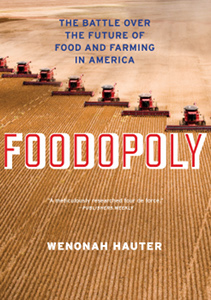
Foodopoly book cover
Photos: Wenonah Hauter, Abby Greenawalt
The United States is in a food crisis the result of government deregulation and the practices of a small group of large and powerful corporations, says Wenonah Hauter, a national healthy food advocate. After researching the subject she outlined her findings in Foodopoly: The Battle Over the Future of Food and Farming in America (The New Press, $26.95). The process of researching, writing and publishing the 355-page hard cover book required 18 months. Consolidation in the food industry and corporate control of the food processes make it impossible for farmers to produce healthy crops and ultimately reduce and impoverish consumers choices at the store, she says.
Hauter describes how independent farmers and food processors have been driven out in place of Cargil, Tyson, Kraft and ConAgra among others. Deregulation in turn has weakened the antitrust laws reducing competition. Consumers should have benefited from the economies of scale resulting from the lesser competition and large production facilities but they haven’t, she says; adding that the industry is rife with politically driven policies designed to benefit the already large and powerful companies in the lead.

Wenonah Hauter, author, Foodopoly
Examples of such policies, she says, include irrigation subsidies with publicly funded water projects, the enactment of the Cuban sugar tariff resulting in high fructose corn syrup replacing sugar in the top spot, and poor federal oversight that keeps the United States Department of Agriculture (USDA) from testing meat for contaminants.
The author points to USDA data indicating that only 5 percent of farms supplying local markets are large but that those farms were the source of 93 percent of the so called local foods in supermarkets and restaurants; while 81 percent of farms selling local food are small with sales of $50,000 or less, and 14 percent of farms selling local foods are medium with sales between $50,000 and $250,000. The small and medium farms accounted for three quarters of direct to consumers foods, and 7 percent of the local foods in supermarkets and restaurants.
She believes the local food movement is insufficient to solve the problems our country faces. Instead, she proposes that drastic political measures are required to reform the broken system. She was too busy to respond to questions for this article or accept an invitation for a podcast interview, according to a spokesperson. To a question about the impact the book published in 2012 has had so far the spokesperson replied: “As Wenonah travels across the country she has met with hundreds of people who thank her for speaking truth to power. They tell her that Foodopoly has inspired them to do the same. This is the first step towards growing leaders who can grow the movement for real change.”
Hauter is executive director of Food & Water Watch. She has worked at the national level on food, water, energy and environmental issues. She owns an organic farm that provides vegetables to five hundred families in the area as part of the Community Supported Agriculture (CSA) program. In 2008, she wrote Zapped! Irradiation and the Death of Food with Mark Worth and in that same year contributed to the collection of essays Water Consciousness.
In response to a question about the political power changes she talks about in the book, the spokesperson replied: “The political shifts discussed in the book didn’t happen overnight, so we can’t expect them to shift back overnight either. Fundamentally fixing the food system is going to take some time — a decade or more to begin to see real change. As Wenonah says in the book, there are no shortcuts to building the long-term political power needed to reclaim our food system, our democracy and our commons. That said, people are becoming more alert and tuned into the corporate abuses of our food system. The fact that activists were able to pressure more than 5 percent of grocery stores, including Whole Foods and Trader Joe’s, to agree not to sell GE salmon, is one recent indicator that more and more people are paying attention and mobilizing. However, we need more of those people to engage in the political system and hold their elected officials accountable.”
Comments:
Filed Under: Books
Posted by Elena del Valle on May 1, 2013

Senior real estate communications professional/strategic thinker with proven experience in marketing, public relations and related disciplines seeks full-time or project assignments in Chicago. Helped build brand for leading Chicago-headquartered and international commercial real estate associations. Management experience with associations, agencies and corporations. Strategic planning, project management and team-building skills. Click to read the entire Chicago PR/Marketing Communications Professional Seeks Opportunity





















